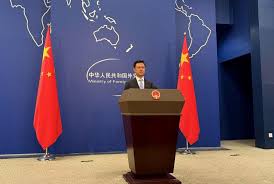Chinese smartphone brands gain popularity in Middle East

Henan Daily
Zhengzhou: In recent years, Chinese smartphone brands have seen a steady rise in their sales in the Middle East.
According to data released by Singapore-based market research firm Canalys, smartphone shipments in the Middle East (excluding Türkiye) reached 11.5 million units in the second quarter of 2024, marking a 20 percent year-on-year increase.
In the third quarter of 2024, the Middle East smartphone market (excluding Türkiye) grew by 2 percent year on year, with shipments reaching 12.2 million units, according to Canalys’ research.
Notably, three major Chinese brands – HONOR, Transsion, and Xiaomi – account for nearly 50 percent of the region’s market share.
Arabian Gulf Business Insight observed that Chinese smartphones are winning over Middle Eastern consumers with better camera performance, larger battery capacities, and affordable pricing.
The Middle East is an early adopter of 5G technology. This new generation of telecommunications technology has advanced industries such as software, internet services, and e-commerce in the region. According to The National, a mainstream newspaper in the United Arab Emirates (UAE), the region’s digital economy is projected to hit $780 billion by 2030, which would significantly outpace the global average through the end of the decade.
The rapid development of the digital economy and continuous improvement of digital infrastructure, such as mobile internet, have boosted the smartphone market in the region.
At Dubai Festival City Mall in the UAE, a Chinese smartphone brand’s consumer experience store displays a variety of foldable smartphone models, attracting shoppers to explore, consult and test the devices.
Azhad, a store employee, particularly presented the HONOR Magic V3, the latest model unveiled by Chinese smartphone maker HONOR. He explained that this model boasts a long battery life, a lightweight design, and a built-in translation feature supporting ten languages, including Chinese, English, and Arabic.
“Since its launch, the model has become the best-selling smartphone in our store,” Azhad said.
In recent years, Chinese smartphone brands such as Xiaomi, Transsion, and HONOR have introduced a range of cost-effective and high-performance models, while also continuously expanding their sales channels. The strong performance and trendy designs of these models have frequently placed them at the forefront of the sales charts on Middle Eastern e-commerce platforms.
Chinese smartphones prioritize customer demand, offer high-quality specifications, and often bring forth innovations, said Ahmed Al Zarouni, a UAE tech expert and writer who has been closely monitoring the smartphone industry.
He observed that after more than a decade of development, Chinese smartphone brands have become major players leading global smartphone advancements.
The popularity of Chinese smartphones in the Middle East is attributed to Chinese companies’ adaptability and commitment to meeting local consumers’ diversified needs.
According to a senior executive with HONOR’s Middle East and Africa division, since establishing their presence in the Middle Eastern market, Chinese smartphone brands have been increasing their R&D investment, enhancing after-sales services, and launching innovative products and services to provide users with more personalized experience. The senior executive noted that in 2024, HONOR’s smartphone sales in the Middle East and Africa grew by 66 percent year on year.
Market analysts pointed out that the Middle Eastern smartphone market is rapidly developing. For companies looking to establish or increase their presence in the region, it is crucial to understand local culture and consumer preferences, and flexibly adjust marketing strategies in line with local conditions.
With the rapid advancement of large artificial intelligence (AI) models, Chinese smartphone manufacturers are accelerating the application of AI technology in their devices.
“Chinese smartphone brands have been innovating their AI applications, making smartphones an essential tool for our life and work,” said Ahmed, as he showcased a Chinese smartphone model featuring an advanced translation app enabled by large AI models, which can provide accurate multilingual translations.
According to forecasts from International Data Corporation, 170 million next-generation AI smartphones are expected to be shipped in 2024, representing almost 15 percent of the total smartphone market.
As Middle Eastern countries push forward the AI development, Chinese smartphone brands, including HONOR, Xiaomi, and OPPO, have rolled out new AI smartphone models in the region since 2025, striving to expand their market presence.
Ahmed noted that Chinese companies boast unique advantages in smartphone R&D and manufacturing, and in particular, they are making constant breakthroughs in AI technologies. These strengths will further propel their development in the region, said Ahmed.




